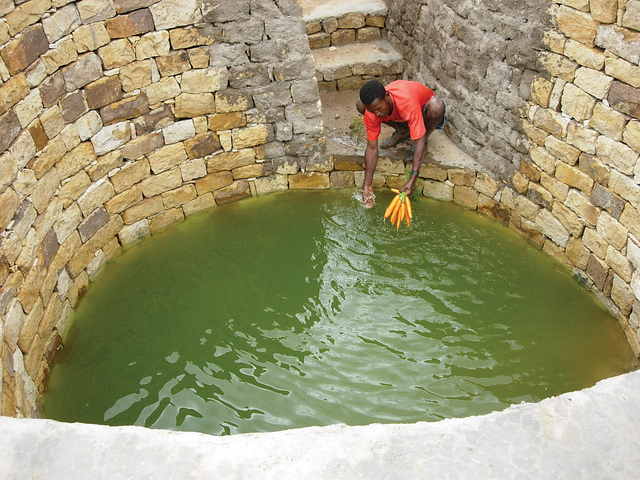IFPRI’s recent 40th anniversary provides an opportunity to take stock of the Institute’s policy influence and impact over the years. Has IFPRI been a worthwhile undertaking? What does available evidence tell us about IFPRI’s impact on food policies? How can we increase IFPRI’s influence in the future? This series of posts explores the research gauging the impact of our programs around the world.
How does IFPRI stack up as a research organization? An external assessment by Peter Hazell and Roger Slade reviewed what is known about the impact of IFPRI’s research programs and projects, looking at publications data, external reviews, and a series of independently conducted impact assessments.
Over its 40 years, IFPRI has published 1,515 papers in leading journals (tracked by the Institute for Scientific Information), and each of these have been cited on average 14 times in those same journals. These numbers are comparable to many leading universities in the United States and United Kingdom, and to World Bank publication and citation counts, over a similar period. Many of IFPRI’s publications are designed for a broader audience—policy makers in particular. The Research Papers in Economics (RePEc) database uses a count of these publications, and how often they are downloaded or cited, to rank research organizations. Here too, IFPRI consistently ranks high: second among research organizations working in agricultural economics, second among those working on Africa, and sixth among those working on development—indicating that its work is highly influential.
Publications have helped disseminate IFPRI’s research around the world, but has this research led to policy change? Measuring the impact of policy-oriented research is very challenging. The pathway from research, to policy change, to improvements in food and nutrition or reductions in poverty is often long and complicated—and difficult to trace. Yet, impact assessments are essential if we want to improve the outcomes of IFPRI’s work.
A series of independent assessments that began in 1997 provide detailed evidence about IFPRI’s impact. This series has evaluated 28 research programs and projects, and provided a much-needed look into appropriate methodologies for assessment of policy-oriented research. Seven studies evaluated research that had a country focus, and at this level it is a little easier to trace an implicit “impact pathway” from research to policy influence and ultimately impact. These studies included evaluations of IFPRI’s impact on the design of two large-scale anti-poverty programs—PROGRESA/Oportunidades in Mexico and the Productive Safety Net Program in Ethiopia—as well as contributions to a Food for Education Program in Bangladesh and rice market policies in Vietnam. They also looked at the impact of these programs—for example, improved targeting of safety net programs and reduced “leakage” of transfers—which gives us an idea of how IFPRI’s contributions shape food and nutrition outcomes.
More evaluations have been done on the regional and global levels because a substantial fraction of IFPRI’s research either addresses policy themes of global significance or seeks to identify new or improved policies on specific issues applicable to groups of countries facing the same problem. Studies of this work evaluate IFPRI’s research on gender analysis, rural public investment, water policy, rural finance, economy-wide modeling, international trade, agricultural projections, high-value agriculture, and social protection programs. While it wasn’t possible to devise quantitative measures of IFPRI’s impact in these important areas, the qualitative evidence shows that IFPRI’s work has added to global knowledge and influenced thinking on these topics. For example, research on gender differences in household decision making, which developed economic models, data collection methods, and evidence of the benefits of gender analysis, influenced policies of major donors.
When IFPRI’s research leads to successful policy change, the impact can be substantial. Several studies have succeeded in quantifying the benefits of IFPRI’s work. These capture just a tiny fraction of IFPRI’s work over 40 years, but the estimate they provide of IFPRI’s impact is significant. In addition to the studies mentioned above on programs in Mexico, Ethiopia, and Vietnam, estimates are also available for IFPRI’s work on rural roads investment in India, abolition of the rural rationing program in Bangladesh, and influence on research and development investment in Kenya and Tanzania. While these estimates are subject to some strong assumptions, the total benefit of this work could exceed $1 billion—enough to cover about 75 percent of IFPRI’s total spending over the period 1976–2014. In fact, the full benefits may be much larger, since these estimates do not include the benefits from cross-country spillovers and the contribution to the global knowledge base.
These numbers tell us that IFPRI has likely benefited a large number of the world’s poor, including many ultra-poor households, in which individual family members subsist on less than $1.25 a day.
But how can IFPRI increase the impact of its research? Many of the impact studies point to a similar set of recommendations. Policy research results can be better communicated, better understanding of how research can lead to change, improving uptake through globally relevant research and support for capacity building, and better planning through setting priorities.
A common lament in nearly all of the impact studies is a lack of credible evidence for ex post evaluations—when research is conducted, little attention has been paid to monitoring and evaluation. Without clear definition of impact pathways, goals, and indicators, it is difficult to know what has been achieved. Regular, high-quality monitoring and evaluation could pay large dividends by providing learning and feedback loops, providing solid empirical data on outputs, and—with time—on outcomes, adding valuable evidence on IFPRI’s policy impact.
Pamela Stedman-Edwards is publications team leader in the Communications and Knowledge Management Division at IFPRI.







